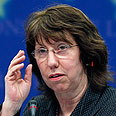
EU adopts new sanctions against Iran
Similar to US, European foreign ministers approve new round of economic sanctions on Iran, which target country's energy industry and foreign trade, blacklist additional banks
The European Union on Monday formally adopted a package of new sanctions against Iran, targeting the country's foreign trade, banking and energy sectors.
The move, which was agreed to in principle by EU leaders in June, is the latest in a series of measures taken by the international community in an effort to halt Iran's nuclear program.
EU foreign ministers adopted a decision "on a package of restrictive measures" in the areas of trade, financial services, energy and transport, said a diplomat who spoke on condition of anonymity under standing rules.
The new measures will come into force in the next few weeks, after they are published in the bloc's official gazette, officials said.
"We have a comprehensive set of sanctions. This is something where we have all 27 countries working together," EU foreign policy chief Catherine Ashton said ahead of the meeting.
According to the decision reached in June, the sanctions will target dual-use items that could be used as part of a nuclear program, and Iran's oil and gas industry including the "prohibition of new investment, technical assistance and transfers of technologies."
Iran's shipping and air cargo companies will be blacklisted and banned from operating in EU territory, and new visa bans and asset freezes will be imposed on Iran's Revolutionary Guard. The sanctions also encompass trade insurance and financial transactions.
The new European restrictions will come on top of a fourth round of sanctions imposed last month by the UN Security Council to curtail Iran's nuclear program over fears it is developing weapons. The council endorsed those sanctions after Iran rebuffed a plan to suspend uranium enrichment and swap its stockpiles of low-enriched uranium for fuel rods.
The new restrictions are similar to measures adopted by the Obama administration, which has imposed penalties against additional individuals and institutions it says are helping Iran develop its nuclear and missile programs, and evade international sanctions.
Iran denies that it is working on a nuclear weapon, saying its program is intended solely for peaceful purposes such as energy-generation, and that it has the right to enrich uranium under the international nonproliferation treaty.
EU foreign ministers also are expected reaffirm the bloc's invitation to Tehran to hold talks on the issue.
"Our aim is to bring Iran back to the negotiating table," said German State Secretary Werner Hoyer. "We're offering our hand, and all they have to do is to take it."
- Follow Ynetnews on Facebook










